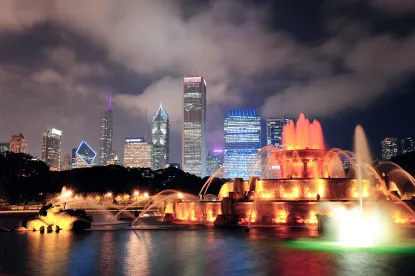While the National Labor Relations Act allows states to enact right-to-work laws, it does not authorize local municipalities to do so, the U.S. Court of Appeals for the Seventh Circuit, in Chicago, has held. I.U.O.E. Local 399 v. Village of Lincolnshire, No. 17-1300 & 17-1325 (7th Cir. Sept. 28, 2018).
This decision is contrary to the Sixth Circuit’s holding in United Automobile, Aerospace, and Agricultural Implement Workers of America Local 3047 v. Hardin County, Kentucky, 842 F.3d 407 (6th Cir. 2016). This creates a circuit split that the U.S. Supreme Court may be called on to resolve.
A “right-to-work” law generally prohibits employers and unions from enforcing or entering into union security provisions, which require employees to join the union or pay dues as a condition of employment. Section 14(b) of the NLRA authorizes states to pass right-to-work laws.
Illinois has not enacted a right-to-work law. In 2015, the Village of Lincolnshire in Illinois enacted a local ordinance with a right-to-work provision. Several unions challenged the ordinance in federal district court, arguing the NLRA preempted the ordinance. In 2017, the federal district court ruled the NLRA preempted the ordinance and the Village appealed.
Citing U.S. Supreme Court precedent, the Seventh Circuit determined that state and local laws banning union security provisions “clash” with Section 8 of the NLRA and would be preempted, unless they fall within the scope of Section 14(b). The Seventh Circuit rejected the argument that by allowing a state to enact right-to-work laws, Section 14(b) permits the state’s authority to be re-delegated to its political subdivisions.
“True, section 14(b) cedes some power back to the states, but it makes no sense to say that states can re-delegate that power …. [N]o one would be able to figure out what is legal and what is not,” wrote Chief Judge Diane Wood.
The Court reasoned that employers operating within multiple local jurisdictions with varying ordinances might be placed in the “impossible position” of having to risk an unfair labor practice charge for refusing to bargain over a union shop clause or civil and criminal penalties for violating the ordinance. The Seventh Circuit’s decision relied on the potential for “other administrative nightmares” based upon the sheer number of local jurisdictions in Illinois.
The Seventh Circuit also ruled that the NLRA preempted two other provisions of the Village’s ordinance, which restricted the use of union hiring halls and dues checkoff.
Until the Supreme Court settles the issue, municipalities in Illinois, Indiana, and Wisconsin (which are covered by the Seventh Circuit) are prohibited from passing right-to-work laws, while those in Kentucky, Michigan, Ohio, and Tennessee (which are covered by the Sixth Circuit) are free to adopt right-to-work laws.






 />i
/>i

